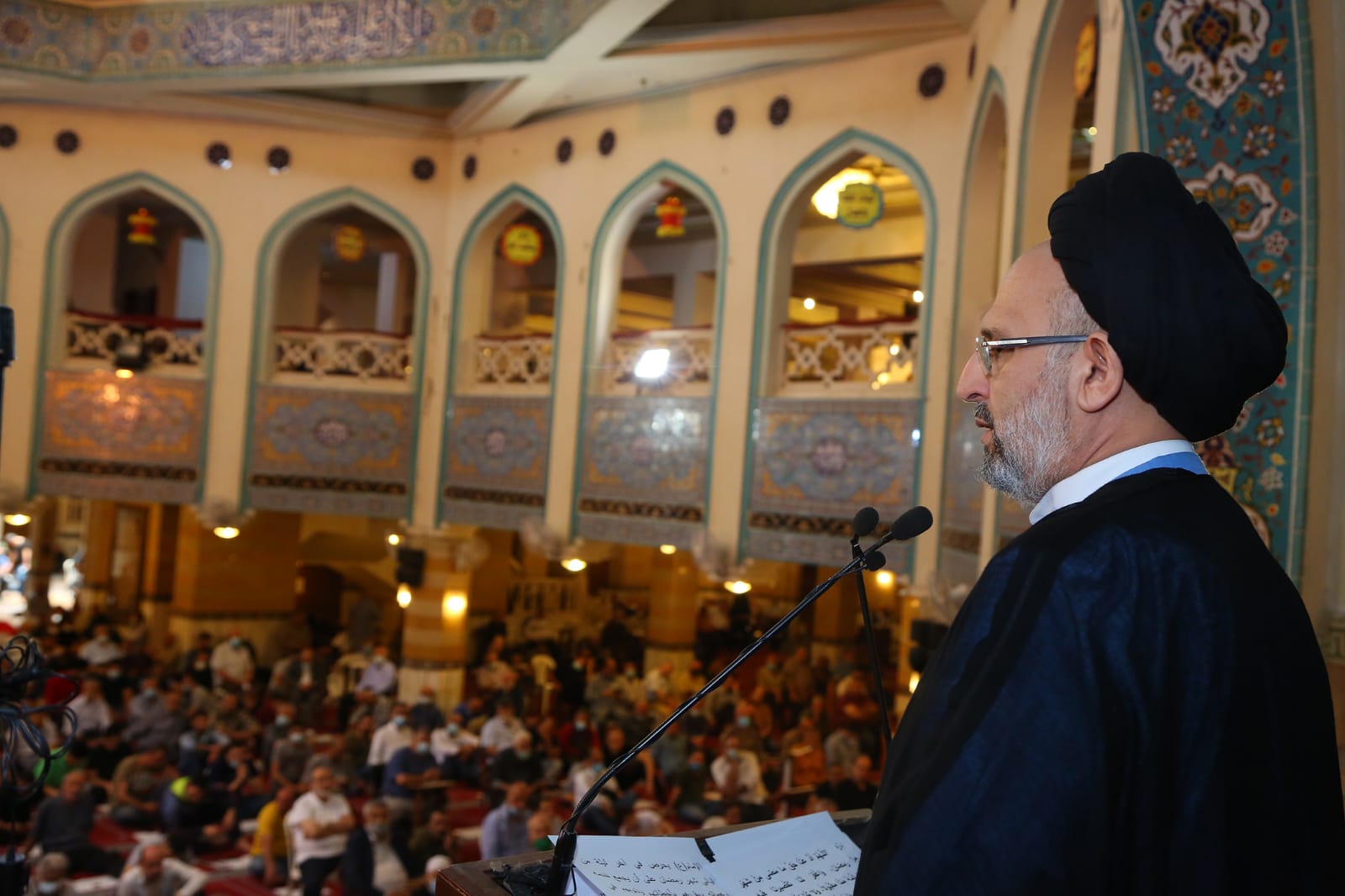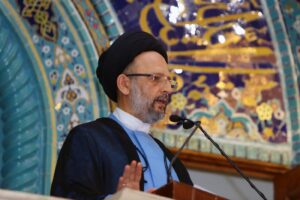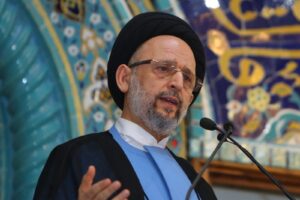Do not forget graciousness between you
In The Name of Allah, The Compassionate, The Merciful
Do not forget graciousness between you
His Eminence, Sayyed Ali Fadlullah, delivered the two Friday prayer sermons at the Imamain Al-Hassanain Mosque, Zul-Qida 24, 1443H. – June 24, 2022. Several prominent religious scholars, dignitaries and believers attended the Jumu’a prayer. Following is the edited text of the two sermons:
The first sermon
Allah, The Most Exalted, says in His Glorious Book: And do not forget graciousness between you. Indeed Allah, of whatever you do, is Seeing. Allah, The Most Exalted, speaks the truth.
This Ayat was revealed in the context of divorce. It aims to prevent the consequences of divorce, because it usually leads to enmities not only between the husband and wife, but also between their families, their children, and their environment. It is enough to look around us to notice how grave these consequences are.
Once the divorce takes place, secrets are unveiled and the faults and the drawbacks of the other are brought to the open. It is as if the couple have not lived together under the same roof as neither of them remember the good things about the other partner.
The Ayat we cited above calls on both parties not to let the divorce lead them to forget all the time they lived together, and the sacrifices they had made, in the hope that they will reduce the tension and minimize the differences. Moreover, if it does not make them return to their married life, it could make them find reasonable understandings to issues like children’s custody or the dowry and the
like. It will also reduce the urge to payback and revenge.
Here are some manifestations in our community of this Ayat that we would like to highlight as an example which the adversaries ought to follow:
First example: it is that of the husband who keeps his divorced wife and their children in home and rents another house which might be in the same building, and continues to support them as though they were married…
The second example: it is that of the husband who foregoes his right for his children custody, despite the fact that his wife was the one who asked for divorce, in view of her motherhood and need to keep her children with her…
The third example: it is that of the wife who forgoes her dowry when she finds that her husband is unable to pay.
We are in a dire need to practice these values that God wants us to build our marriage life upon: Women have the same rights against their men as men have against them.
He wanted these values to continue to be practiced even if divorce occurs, as it usually ends with ingratitude which we see its results in court. Then, either keep [her] in an acceptable manner or release [her] with good treatment. Although the Ayat we cited And do not forget graciousness between you is talking about divorce, it constitutes
a general rule that should govern the relations with the people whom we depart whether due to death or travelling and whether they are relatives, neighbors, teachers, servants, workers…We ought not forget their giving and we ought to show our gratitude, and not to forget their graciousness as circumstances change, or if we happen to differ with them. We ought, as God commanded us, to be thankful to them. Imam Zein al-Abdien (a.s.) says: The right of him who does a kindly act (dhu l-ma’ruf) toward you is that you thank him and mention his kindness; you reward him with beautiful words and you supplicate for him sincerely in that which is between you and God. If you do that, you have thanked him secretly and openly. Then, if you are able to repay him one day, you repay him.
This attitude was demonstrated in all the Messenger (p.)’s deeds. Following are some examples:
First: his attitude towards his first wife Khadija who had an impact on his life and the Message and whom he always used to remember and praise. It is narrated that he was very angry when he heard one of his wives saying that God has given him a better wife than Khadija. He completely denied that and added: she believed in me when no one else did; she accepted Islam when people rejected me; and she helped and comforted me when there was no one else to lend me a helping hand“.
He also told the believers not to kill Abu Albukhtaty bin Hisham if they meet him in battle in gratitude for his stance against the embargo Quraish imposed on Banu Hashim. He also pardoned one of his companions who informed Quraish that Muslims intended to open Mecca, owing to the fact that he fought in the battle of Badr…
Dear loved ones: May God grant us success to practice this virtue in our lives: to pay back those who do us good even by a little, thus expressing our belief as well as our gratitude and deepening the feelings of love and compassion for the sake of doing more good in our society…
The second sermon
Worshippers of Allah, The Most Exalted, I advise you and myself with the advice of Luqman to his son not ascribe partners to God and be content with what He decrees, to love for people what you love for yourself… be charitable with those who hurt you and to not follow your whims…
We are in a dire need for these advices that will make us nearer to God and more capable of facing challenges.
We begin by Lebanon where the sufferings of the Lebanese from their living conditions do not seem to end. Instead, they are getting worse, as they can no longer afford to buy their most basic needs including bread, fuel, power and hospitalization.
Moreover, there is not even a glimpse of hope that things are going to change. Those in charge, politically and financially, are even telling them that their sufferings will not end soon and that there is no hope for any solution on the short run and that the country is heading for a more severe collapse, as the government has spent all the money the Lebanese depend on to secure their needs as a result of corruption, waste and mismanagement … The IMF, too, will not provide a solution, since its aid would not be enough and it will be coupled with tough conditions. Meanwhile, those abroad whom the Lebanese are expecting help from, will not give any aid before Lebanon realizes their terms which are not limited to the reforms, but will also entail other conditions which promote their own interests and not those of the Lebanese.
As for the oil and gas that have come to be depended on, They will not be easy to produce, in case they actually exist, and that have now been linked with the maritime border negotiations, which do not seem that they will be concluded soon, owing to the Zionist greed and American stalling…
As for the government which is supposed to run the affairs of the country and provide solutions, we are afraid that although the prime minister has been nominated, forming the government would encounter many barriers and the counter conditions. Nevertheless, even if it were to be formed, it will not achieve much regarding the reforms and the recovery plans…
Regretfully, we can only say to the Lebanese that the only thing you can do in this stage is to depend on yourselves, join hands and help one another …
We also call on the depositors, not to stop demanding to get their money back and to resist those who are trying to silence them or convince them to forego their money in exchange for a small fraction of them.
As for the Zionist threats, repeated lately by several military and political enemy officials, we call for being vigilant towards what it is planning for and readiness on all levels to face any adventure it might venture to take, by enhancing national unity and mobilizing all our points of strength, although we still believe that these threats are part of the psychological war that aims to draw concessions whether with respect to gas or any other field. For Lebanon possesses, through its army, resistance and the people’s readiness to sacrifice, all the potentials that enable it to live in dignity and freedom.




